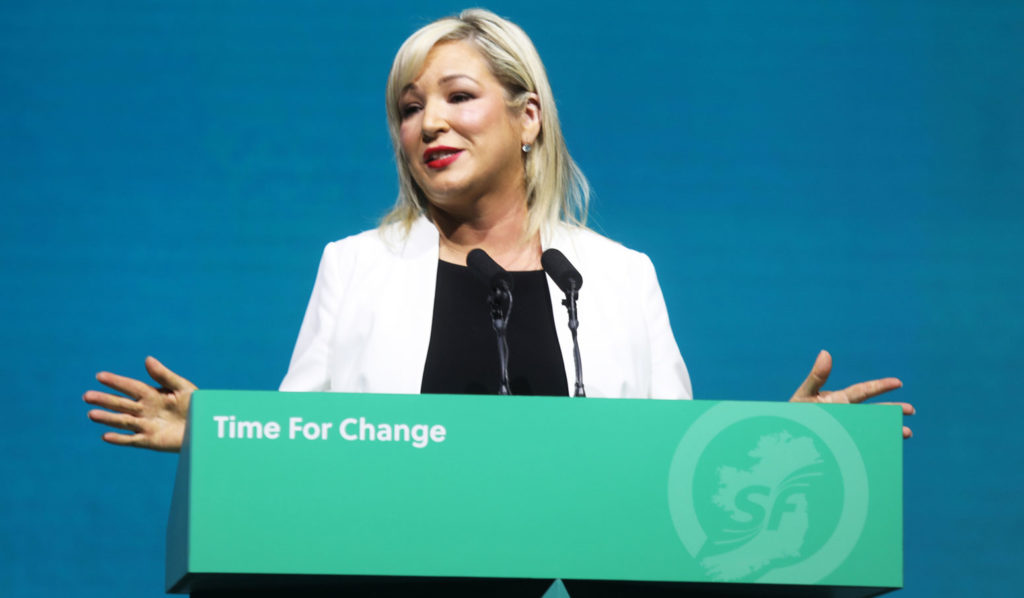Veteran Irish Post commentator PETER KELLY attends the Northern Ireland Assembly to witness history in the making
HISTORY-MAKING is a term regularly rolled out in Northern Ireland. It's almost over-used, as each previously unimaginable milestone is notched up. This week I continue the tradition of The Irish Post joining the world's press assembled at Stormont in east Belfast.
But this time I was there to attend a truly seismic breakthrough of a Sinn Féin First Minister in the place traditionally known as 'a cold house for Catholics'.
The temperature now is decidedly balmy. While there are many hot under the collar at the sight of a parliament now led by an Irish republican, it is hardly a surprise. Unionism's grip on politics has been receding for decades, with astonishing game-changers being registered along the way at each election since the early 2000s. The gradual catch-up of both demographics and nationalist election victories has turned the unthinkable into the inevitable.
But what now? And where now? So many questions accompanied the procession of 90 Assembly Members back 'up the hill' — that is up the long hill that leads to the government building, eventually reaching the corridors of power at Stormont. What will the relationship be like between the first Republican First Minister Michelle O'Neill and her DUP deputy First Minister? All eyes will be on the sustainability of the new dynamic duo and their partnership at Stormont.
Will it be a 'battle a day' between the new DUP and Sinn Féin arranged marriage, as was once predicted between Peter Robinson and Martin McGuinness? That never came to pass, with both predecessors working surprisingly well and pragmatically together.
 First Minister Michelle O'Neill (Image: Leah Farrell/RollingNews.ie)
First Minister Michelle O'Neill (Image: Leah Farrell/RollingNews.ie)Unionist sources remind me that the split between the 'Yay' and 'Nay' camps within the DUP remains perilously close. The tension outside of the party, in the dissenter coalition of TUV and anti-Protocol camps will chip away at the new Sinn Féin-led government and try and force the DUP into eventual withdrawal and collapsing the institutions once more.
But this strategy would be more catastrophic for unionism itself than politics in the North.
As pro-union commentator Alex Kane, former adviser to the First Minister David Trimble warns: if disgruntled Stormont unionists defect to the TUV benches and bring down the institutions, it would be trigger action amid deep resentment in Downing Street who would effectively give up on unionism as a 'waste of time' to deal with.
This would likely result in a London government, irrespective of Tory or Labour, resorting to de facto joint sovereignty with the Dublin government over the North. This ultimate nightmare scenario for unionism forever looms as the stick to cooperate with Sinn Féin.
And so it is more of a last resort necessity alongside begrudgery that propels unionism into the joint Office of First Minister and Deputy First Minister (OFMDFM), now led by their arch-enemies. The DUP will take some relief that their newly found 'deputy' position remains a joint and equal status post. Although the psychological blow is there for all to see, and will take some explaining away to their electorate.
It is also unionism's own clamouring voters that have encouraged them back into reluctant government for pragmatic reasons. The tail winds of the growing pain of the cost of living crisis also felt by DUP supporters on the street is a strong factor in the party's calculations. The recent paralysis of still ongoing strikes across the North by an increasingly alienated workforce have forced the hand of the party to put ideology second and people's livelihoods first.
The new political landscape presents again an opportunity for unionism to modernise and reach out to promote their core value of remaining in the Union itself. To be brand ambassadors for Britannia. To talk up the pluses as they see it.
They have traditionally lagged behind Sinn Féin by decades in the message promotion business. Will their brand of negative naysayers and reluctant begrudgers continue? Recently the DUP have appointed an Assembly Member as a US liaison officer, in an attempt to reach out beyond their traditional caricature.
For Sinn Féin, the long term priority will likely be to promote an eventual border poll by showing their ability to run good government at Stormont. And perhaps to showcase Stormont as an operating 'model for Mary Lou' should Deputy McDonald become Taoiseach and lead an Irish government within the next 24 months. Both the DUP and republicans have huge Work Plans to implement for their long-coveted United Kingdom or United Ireland aspirations.
Whether unionism adapts to make Northern Ireland workable will determine whether partition in Ireland remains or dissolves. For Jeffrey Donaldson and Michelle O'Neill, the defining chapter of their movements — and the fate of the North — is about to begin.
 Peter Kelly of the Irish Post
Peter Kelly of the Irish Post 
